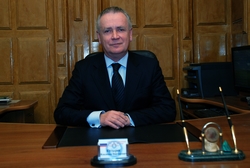
Vladimir V. Kutyrev
V.V. Kutyrev was born on the 30th of August, 1952. In 1975 he graduated from the Saratov Medical University, Department of General Medicine; in 1978 – completed employer-sponsored postgraduate programme in specialty “microbiology” at the premises of All-Union Research Anti-Plague Institute “Microbe”. In 1979, V.V. Kutyrev passed Ph.D. defense, and in 1992 – the doctoral one. While working for the Institute, he went through all the stages of professional development from junior research officer to the head of molecular biology laboratory. In 1997, V.V. Kutyrev was appointed to the position of Director of the Russian Research Anti-Plague Institute “Microbe”. In 2001 he was awarded an academic title of Professor in the specialty of “microbiology”. For the development and implementation into practice of novel aids for prophylaxis, diagnostics, and treatment of anthrax, V.V. Kutyrev was awarded the State Prize of the Russian Federation–2002 in science and technology. In 2005 he was elected as Corresponding Member for the Russian Academy of Medical Sciences, in 2011 – as RAMS Academician. Since 2014 V.V. Kutyrev has been Academician of the Russian Academy of Sciences. In 2010 he was granted the title of honor “Honored Inventor of the Russian Federation”. In 2015, by Presidential Decree No 431, dated August 22, 2015 “In recognition of humanitarian assistance in organization of anti-epidemic response and diagnostics of Ebola in the territory of the Republic of Guinea” he was awarded the Order of Friendship.
Focus areas of his scientific activities are studies of molecular-genetic make-up of genes, encoding synthesis of pathogenicity factors; investigation of molecular-genetic mechanisms, providing for pathogenic properties of microorganisms, as well as molecular premises of interaction between pathogenic bacteria and host-organism and vectors; development of advanced tools and methods for diagnostics of dangerous infectious diseases, based on molecular biology achievements.
Studies, conducted under the leadership of V.V. Kutyrev and with his personal involvement, have allowed for the development of principles and procedures for molecular monitoring over the agents of particularly dangerous infections of bacterial nature. Considerable contribution to buildup of the three-level system of molecular monitoring over agents of dangerous infections, aimed at enhancement of epidemiological surveillance of emerging and reemerging diseases, as well as provision of specialized medical anti-epidemic units preparedness to bioterrorist threats has been made.
Under the supervision of V.V. Kutyrev, self-contained mobile complex of laboratories of different specialty, mounted on the platform of a truck, allowing for the whole specter of laboratory tests, essential for the assessment of epidemiological and sanitary-hygienic situation in emergency zone, has been designed and constructed.
V.V. Kutyrev is the developer of modern tactics for SAET deployment in response to emergency situations in the sphere of epidemiological welfare of the population, providing for diversification of the personnel and technical-engineering resources of SAET, depending upon the character of emergency.
He is the author and contributor to more than 500 scientific publications, including 14 monographs, 8 guidelines and educational aids, more than 40 patents for inventions and utility models.
V.V. Kutyrev is a member of Editorial Council for such Journals as “Problems of Virology”, “Health of the Population and Live Environment”, “Analysis of Health Risks”, a member of Editorial Board for the “Journal of Microbiology, Epidemiology and Immunobiology”, as well as “Saratov Scientific-Medical Journal”.
V.V. Kutyrev is a Chairman of Coordinative Research Council for sanitary protection of the territory of the Russian Federation. Since 2000, he has been heading Coordination Council on matters of sanitary protection of CIS member-states from import and spread of particularly dangerous infectious diseases.










































